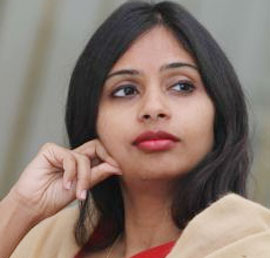 New York, Mar 15: An arrest warrant was today issued against Indian diplomat Devyani Khobragade on visa fraud charges after her fresh indictment by US prosecutors who accused her of “illegally” underpaying and “exploiting” her domestic maid.
New York, Mar 15: An arrest warrant was today issued against Indian diplomat Devyani Khobragade on visa fraud charges after her fresh indictment by US prosecutors who accused her of “illegally” underpaying and “exploiting” her domestic maid.
39-year-old Khobragade, who was arrested in New York on December 12 and has since been transferred to the Ministry of External Affairs in New Delhi, faces arrest if she visits the US where her husband and two children are staying.
Following the fresh 21-page indictment, US Attorney in Manhattan India-born Preet Bharara said in a letter to US District Judge William Pauley that an “arrest warrant was also issued today” against the diplomat and that the government “will alert the court immediately upon the defendant's arrest so that an appearance” before the judge may be scheduled.
The new charges, which came two days after a US court dismissed an earlier indictment on Wednesday, accused her of visa fraud and making false statements about the visa application of her maid Sangeeta Richard.
The indictment states that the diplomat “knowingly made” multiple false representations and presented false information to US authorities in order to obtain a visa for a personal domestic worker.
The fresh indictment filed in a court in Manhattan also charges that Khobragade submitted to the US State Department an employment contract of her domestic worker which she knew contained “materially false and fraudulent statements.”
A grand jury had earlier returned a true bill on the two-count criminal indictment of Khobragade.
The indictment said, “Khobragade did not want to pay the victim the required wages under US law or provide the victim with other protections against exploitative work conditions mandated by US law.
“Knowing that if the US authorities were told the truth about the actual terms of her employment agreement with the victim, Khobragade would not have been able to obtain a visa for the victim, Khobragade decided to make false statements to the US authorities,” it said.
Khobragade was arrested on visa fraud charges and for making false statements regarding the visa application of her maid.
She was strip-searched and held with criminals, triggering a row between the two countries with India retaliating by downgrading privileges of certain category of US diplomats among other steps.
The diplomat has refuted the charges against her.
The indictment gives details of the employment contract that Khobragade entered into with her domestic help.
It states that the diplomat “illegally underpaid and exploited the victim.” It said she kept Richard's passport with her and told the maid that it would be returned once her three-year term of employment was completed.
It also states that “escalating efforts” were made by Khobragade and others “to silence and intimidate the victim and her family and lie to Indian authorities and courts.”
Bharara has submitted as exhibits a copy of the employment contract that Khobragade entered into with Richard that states that she will be paid $9.75 per hour salary and would be required to work for 40 hours a week.
Also submitted is a copy of the FIR filed in India in which Khobragade said she had agreed to pay Richard Rs 30,000 per month, contrary to what she had told the US authorities.
According to prosecutors, Khobragade claimed she paid the woman $4,500 a month, but actually paid her around $3 per hour and made her to work for more hours.
The indictment states that Khobragade knew the actual arrangement between her and Richard “violated US laws” and so she created a “fraudulent employment contract” and had the “victim execute it“.
“Because it was created by Khobragade solely to deceive the US embassy during the victim's (visa) interview,” the employment contract “included false statements” that made it seem as if the diplomat's arrangement with the “victim would comply with applicable US laws”, it said.
The fresh indictment comes after Khobragade got relief from US District Judge Shira Scheindlin who in her order on Wednesday dismissed the earlier indictment on grounds of diplomatic immunity and ordered that any open arrest warrants based on the earlier indictment should be vacated.
Scheindlin's order, however, did not bar federal prosecutors from bringing new charges against the former Deputy Counsel General in a fresh indictment in future.
Bharara said the new indictment was returned charging Khobragade in two counts with visa fraud and making false statements ... which as alleged in the indictment, were “undertaken to facilitate her exploitative employment of a household employee who was grossly underpaid and overworked.”
He further informed the court that “the government respectfully submits that time is automatically excluded from calculation under the Speedy Trial Act...which provides for the exclusion of any period of delay resulting from the unavailability of the defendant.
In this case, the defendant is unavailable because her “whereabouts are known but (her) presence for trial cannot be obtained by due diligence or (she) resists appearing at or being returned for trial.”
Khobragade's lawyer Daniel Arshack, who had said he was “heartened” when the previous indictment was dismissed, did not make any comment





Comments
Add new comment